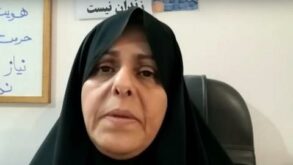Radiofarda – Iranian Supreme Leader Ali Khamenei’s military adviser Hossein Dehghan has likened defiant former President Mahmoud Ahmadinejad to “the door of a mosque, which may not be burnt or thrown away,” an allusion to the fact that Ahmadinjad is part and parcel of the Islamic regime in Iran regardless of his harsh criticism of Khamenei and his government.
Speaking to the conservative weekly magazine Mosallas, Dehghan used the ironic Persian proverb, stressing that Ahmadinejad has always been the same during his two terms in office as President from 2005 to 2013.
Dehghan, who was Ahmadinejad’s defense minister in his second term, used another metaphor, adding “Some people said at the time that Ahmadinejad was “like a fireball in your hand. You could toss it from hand to hand, but you could not let it fall down.”
It is not clear whether this metaphor was used by others in the regime, including Khamenei and Dehghan was just repeating it. Still, Dehgghan’s words be a warning to Ahmadinejad’s critics that Khamenei is not going to get rid of him so easily.
The statement by Dehghan was published shortly before the Iranian year started on March 21. By then Ahmadnejad had already published at least three critical letters to Khamenei, in which he had harshly criticized him and demanded drastic changes in the political system and Khamenei’s own office.
Ahmadinejad was a local governor in Maku and Khoy, small towns in northeastern Iran, during the 1980s. He became governor general of Ardabil province in the 1990s, was Tehran’s mayor from 2003 to 2005 and was twice elected as Iran’s President in 2005 and 2009.
The disputed 2009 election which brought millions of protesters to streets and ignited the reformist Green Movement, as well as his controversial actions and statements made him world famous.
In 2011, when his intelligence minister resigned under his pressure, Khamenei overturned his decision and the two characters fell out.
The gap between the two became increasingly wider ever since and other Iranian conservatives close to Khamenei distanced themselves from Ahmadinejad.
Ahmadinejad started writing and publicizing his critical letters to Khamenei after his disqualification to run for President in May 2017 and as the Iranian Judiciary increased its pressures on Ahmadinejad’s aides. His criticisms mainly targeted Judiciary Chief Sadeq Amoli Larijani and his brother parliament speaker Ali Larijani.
Recently, as his criticism also targeted Khamenei and his office and demanded major structural reforms in Iran’s political system, Khamenei indirectly accused him of “doing the enemy’s job,” and “playing the art of the opposition although he was in control of the country for eight years.”
Khamenei said most recently that “Some people are being unfair. They use the freedom existing in the country to say that there is no freedom. And foreign media reflect their statements.” This was clearly a direct response to Ahmadinejad who had written to him that “No trace of freedom has remained in the country after four decades of rule by Islamic Republic.”
Dehghan’s statement could reflect the Khamenei’s’s difficult position in dealing with the defiant and outspoken former president; a situation that has evolved to become yet another deadlock in a political system already plagued with paralyzing economic, political and cultural bottlenecks.
 Shabtabnews In this dark night, I have lost my way – Arise from a corner, oh you the star of guidance.
Shabtabnews In this dark night, I have lost my way – Arise from a corner, oh you the star of guidance.




